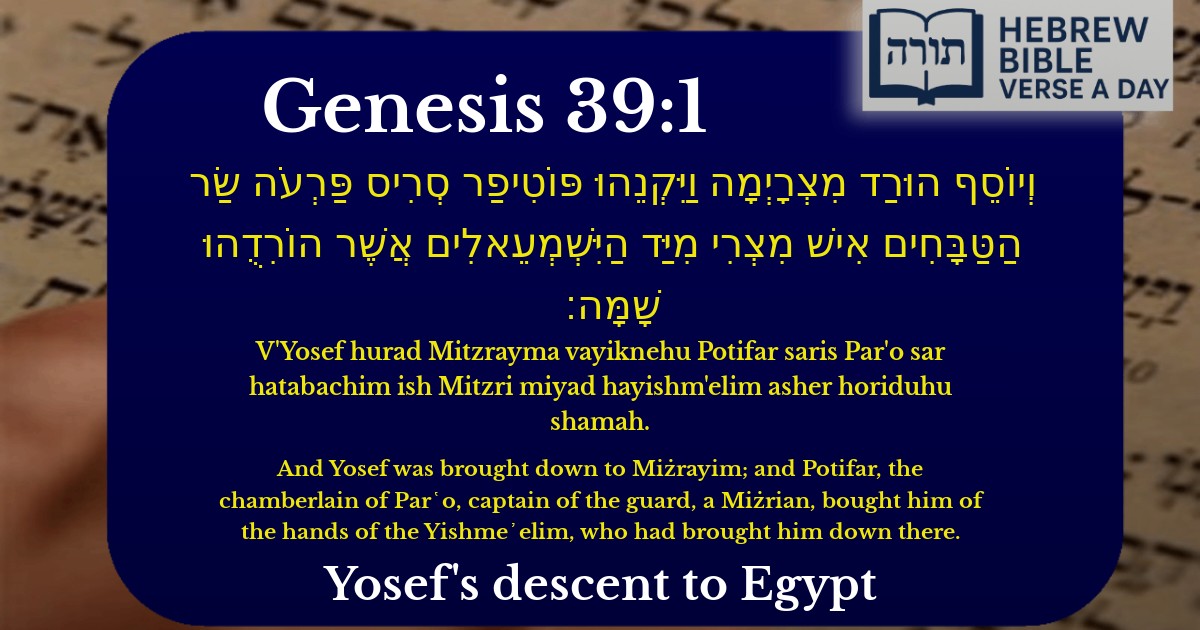Join Our Newsletter To Be Informed When New Videos Are Posted
Join the thousands of fellow Studends who rely on our videos to learn how to read the bible in Hebrew for free!
Hebrew Text
וְיוֹסֵף הוּרַד מִצְרָיְמָה וַיִּקְנֵהוּ פּוֹטִיפַר סְרִיס פַּרְעֹה שַׂר הַטַּבָּחִים אִישׁ מִצְרִי מִיַּד הַיִּשְׁמְעֵאלִים אֲשֶׁר הוֹרִדֻהוּ שָׁמָּה׃
English Translation
And Yosef was brought down to Miżrayim; and Potifar, the chamberlain of Par῾o, captain of the guard, a Miżrian, bought him of the hands of the Yishme᾽elim, who had brought him down there.
Transliteration
V'Yosef hurad Mitzrayma vayiknehu Potifar saris Par'o sar hatabachim ish Mitzri miyad hayishm'elim asher horiduhu shamah.
Hebrew Leining Text
וְיוֹסֵ֖ף הוּרַ֣ד מִצְרָ֑יְמָה וַיִּקְנֵ֡הוּ פּוֹטִיפַר֩ סְרִ֨יס פַּרְעֹ֜ה שַׂ֤ר הַטַּבָּחִים֙ אִ֣ישׁ מִצְרִ֔י מִיַּד֙ הַיִּשְׁמְעֵאלִ֔ים אֲשֶׁ֥ר הוֹרִדֻ֖הוּ שָֽׁמָּה׃
וְיוֹסֵ֖ף הוּרַ֣ד מִצְרָ֑יְמָה וַיִּקְנֵ֡הוּ פּוֹטִיפַר֩ סְרִ֨יס פַּרְעֹ֜ה שַׂ֤ר הַטַּבָּחִים֙ אִ֣ישׁ מִצְרִ֔י מִיַּד֙ הַיִּשְׁמְעֵאלִ֔ים אֲשֶׁ֥ר הוֹרִדֻ֖הוּ שָֽׁמָּה׃
🎵 Listen to leining
Parasha Commentary
📚 Talmud Citations
This verse is quoted in the Talmud.
📖 Sotah 13b
The verse is referenced in a discussion about Joseph's sale into Egypt and the role of the Ishmaelites in his journey.
📖 Pesachim 119a
Mentioned in the context of discussing the descent of Joseph into Egypt and the subsequent events leading to the Israelites' settlement there.


Yosef's Descent to Mitzrayim
The verse states, "וַיּוֹסֵף הוּרַד מִצְרָיְמָה" ("And Yosef was brought down to Mitzrayim"). Rashi explains that this descent was not merely physical but also spiritual—Yosef was lowered from his elevated status as the beloved son of Yaakov to the depths of servitude in a foreign land. The Midrash (Bereshit Rabbah 86:1) notes that this event was part of a divine plan, setting the stage for the eventual descent of Yaakov's entire family to Mitzrayim, fulfilling the prophecy given to Avraham in Bereshit 15:13.
Potifar's Role and Title
The verse identifies Potifar as "סְרִיס פַּרְעֹה שַׂר הַטַּבָּחִים" ("the chamberlain of Pharaoh, captain of the guard"). The term סריס (sarís) often denotes a high-ranking official rather than a literal eunuch (see Rashi on Bereshit 37:36). The Ramban suggests that Potifar held a dual role: overseeing Pharaoh's household (sarís) and commanding the royal executioners (sar hatabachim), indicating his significant authority.
The Sale to Potifar
The verse emphasizes that Potifar "וַיִּקְנֵהוּ... מִיַּד הַיִּשְׁמְעֵאלִים" ("bought him from the hands of the Yishmaelim"). The Talmud (Sotah 13b) discusses why the Torah specifies that the Yishmaelim were the sellers, noting that this fulfilled the earlier animosity between Yishmael and Yitzchak's descendants. Additionally, the Midrash (Tanchuma Vayeshev 8) highlights the irony that Yosef, who was sold for silver, would later control Mitzrayim's wealth.
Divine Providence in Yosef's Journey